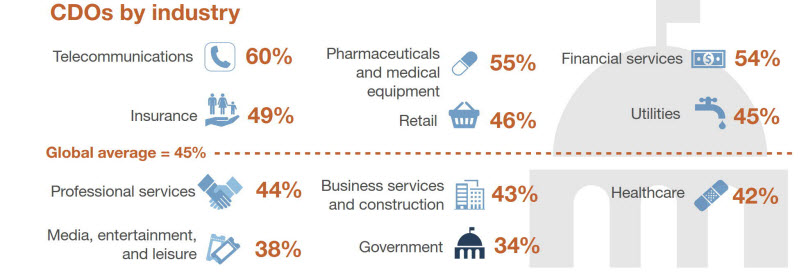 NEWS
NEWS
 NEWS
NEWS
 NEWS
NEWS
Organizations are more likely to achieve faster growth if they hire a Chief Data Officer (CDO), according to a new report from Forrester Research Inc.
That was the conclusion of a survey of 3,005 business and technology decision-makers at companies with 100 or more employees in Australia, Brazil, Canada, China, France, Germany, India, New Zealand, the U.K. and the U.S. Forrester says it found evidence of a high correlation between high-performing companies and those with CDOs.
According to Forrester, 54 percent of firms with 10 percent or greater revenue growth year-on-year have a CDO on the books. In contrast, just 33 percent of companies with less than four percent revenue growth have a CDO.
“The data does seem to support that higher performing companies are just better with data,” said Gene Leganza, a Forrester analyst and co-author of the report, in an interview with Information Week.
In addition to a higher growth rates, companies with a CDO can enjoy plenty of other benefits. Forrester’s report found that they are 70 percent more likely to ensure compliance and reduce risks, and 60 percent more likely to increase business agility compared to firms that don’t have a CDO in place.
One of the most surprising findings of Forrester’s report is there’s much less animosity between CDOs and CIOs (Chief Information Officers) than is commonly thought. The two roles are sometimes perceived to rival one another, but Forrester’s research suggests there’s actually a great deal of collaboration between CDOs and CIOs in the companies that have both.
“Most of the CIOs we talked to are very happy to have their organization invest in data improvements because they don’t have time to do it,” the report notes.
One surprising finding in the report is that Forrester claims 45 percent of the companies it surveyed have a CDO in place. Wikibon Chief Research Officer Dave Vellante expressed surprise at that figure, pointing out that research discussed at the MIT CDO conference two years ago found that less than ten percent of companies had a formal CDO role.
“It sounds a bit high to me,” Vellante said, “but it wouldn’t surprise me to see one-third of organizations formalizing that role or having some type of ‘Data Czar’ on the books in the near-term, especially in regulated industries such as financial services and healthcare.” Vellante suggests that some organizations may have a “de facto CDO” on staff without the formal title and that may have bled into the Forrester study.
Titles aside, the research suggests that companies that have someone in place to drive their Big Data initiatives hold an advantage other those that don’t, said Paul Gillin, SiliconANGLE’s Enterprise Editor.
“The bottom line is that jobs or titles have nothing to do with a company’s success,” Gillin said. “In this case, the title may be more symbolic than anything else. Having a CDO means the company is serious about being data-driven.”
That’s not to say everybody needs a CDO or someone to oversee their data initiaves. For some organizations, such as Netflix Inc. and Uber Technologies Inc., their entire business revolves around the use of Big Data anyway, and so there’s no pressing need to centralize a Big Data strategy.
“Uber and Netflix are data-driven at their core; that’s their entire business,” Gillin said. “They don’t need a CDO when everyone is effectively doing that job already.”
Support our mission to keep content open and free by engaging with theCUBE community. Join theCUBE’s Alumni Trust Network, where technology leaders connect, share intelligence and create opportunities.
Founded by tech visionaries John Furrier and Dave Vellante, SiliconANGLE Media has built a dynamic ecosystem of industry-leading digital media brands that reach 15+ million elite tech professionals. Our new proprietary theCUBE AI Video Cloud is breaking ground in audience interaction, leveraging theCUBEai.com neural network to help technology companies make data-driven decisions and stay at the forefront of industry conversations.